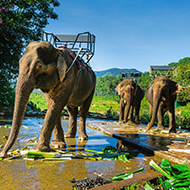Digital programme to support animal carers in Vietnam

The programme has been designed to upskill staff working with wild animals in captivity.
A digital animal husbandry programme to support wildlife caregivers across Vietnam has been launched in the country’s national language.
International charity Wild Welfare’s “Wild About Welfare” programme is produced in partnership with The Jeanne Marching International Centre for Animal Welfare Education (JMICAWE) at the University of Edinburgh.
The free online programme is already available in English and Japanese, and is now available to Vietnamese speakers working with captive wildlife in zoos, animal sanctuaries and aquariums.
Simon Marsh, UK director of Wild Welfare, said: “Ensuring animal welfare resources are available in people’s native languages is vital in helping to make certain our charity’s work really has a positive impact on captive wildlife welfare in all corners of the globe. The Wild About Welfare programme has been designed to upskill staff working with wild animals in captivity and give them the knowledge to be able to deliver good care and welfare.”
Wild Welfare has hosted welfare training workshops for zoological facilities in Vietnam for several years. It has also been forming collaborations to push ahead with positive welfare changes for animals under the care of humans.
There are some 100 captive wild animal facilities across Vietnam, and animal welfare is a relatively new concept within the country - meaning it is vital to bridge the knowledge and skills gap to ensure a good level of animal care.
Wild Welfare believes the availability of accessible and engaging information about animal welfare science in Vietnamese can help to address these gaps, giving care teams the tools required to provide optimal animal welfare.
To represent the scope of countries it is active in around the world, Wild Welfare has announced that it is already translating the programme into other languages.
The Wild About Welfare animal husbandry e-learning programme is available on the charity’s website.



 HMRC has invited feedback to its communications regarding the employment status of locum vets and vet nurses.
HMRC has invited feedback to its communications regarding the employment status of locum vets and vet nurses.